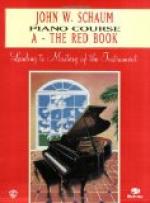“For some reason unknown to me, it has come to be imagined that I have studied with Leschetizky; this is entirely refuted when I say I have never been in Vienna. It seems we are getting away from the idea of helping ourselves out with the name of some great teacher. The question should be: What has the player in himself, what can he accomplish? not, Whose pupil is he? We know of some of Leschetizky’s famous pupils, but we never hear of the thousands he must have had, who have come to nothing. A teacher can only do a certain amount for you; he can give you new ideas, which each pupil works out for himself in his own way. The piano student learns from so many different sources. He attends a piano recital and acquires many ideas of touch, tone, phrasing and interpretation; he hears a great singer or violinist and absorbs a wholly new set of thoughts, or he listens to a grand orchestra, and gains more than from all the others. Then there is life to study from: experience—living—loving: all go into the work of the musician. A musical career is indeed the most exacting one that can be chosen.
“I have been asked whether I prefer to play for an audience of ‘music-lovers’ or one of ‘music knowers.’ Perhaps an equal mixture is the happy medium. Of the two sorts it seems to me the music-knowers are preferable, for even if they are very critical, they also recognize the various points you make; they see and appreciate what you are striving for. They are not inclined to say, ‘I don’t like such or such a player’; for the music-knower understands the vast amount of time and energy, labor and talent that go to make a pianist. He rather says, ’I prefer the playing of such or such an artist.’ The word ‘like’ in connection with a great artist seems almost an affront. What does it matter if his work is not ‘liked’ by some? He knows it can stand for what it is—the utmost perfection of his powers—of himself. And after all the audience is the greatest teacher an artist can have; I have learned more from this teacher than from any other. In this school I learn what moves and touches an audience; how to improve this or that passage; how to make a greater climax here, or more sympathetic coloring there. For in conceiving how a work should sound, I get—in my study of it—a general idea of the whole, and make it as nearly perfect as I am able. But it has to be tested and tried—an audience must pass its opinion—must set the seal of approval upon it. When the work has been polished by repeated trials in this school, interpretation then becomes crystallized in the mind and the piece can always be given in nearly the same way. A painter does not change nor repaint his picture each time he exhibits it; why need the musician change his idea of the interpretation at each repetition? To trust too much to the inspiration of the moment might injure the performance as a whole. When I have my ideal of the interpretation worked out in mind, it becomes my sacred duty to play it always




